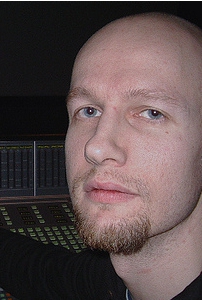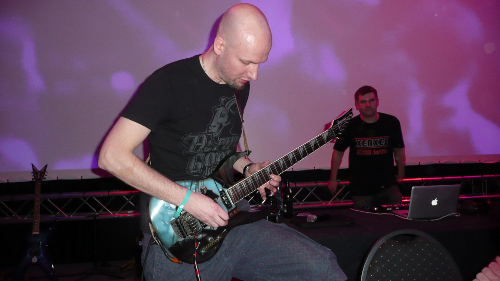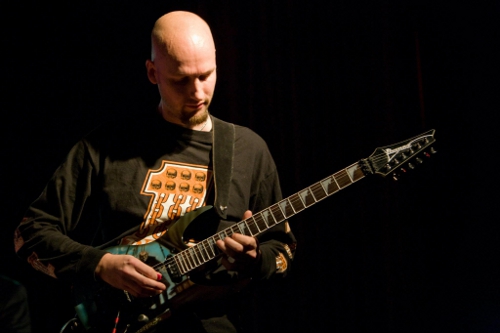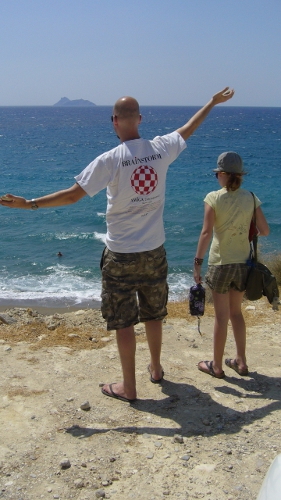- What Is The Real Name Of Romeo Knight From Red Sector?
- What Is Romeo Knight, One Of The Amiga’s Top Musicians Doing Today?
- What Was The Amiga Demo Scene Like In The 1980s?
Full Interview Audio

Personal Info
Favourite Books:
- Perfurme by Patrick Suskind
Most Influenced By:Rob Hubbard, Martin Galway, Tim Folon, Chris Hulsbeck
Personal Blog: http://www.facebook.com/pages/Romeo-Knight/298320186844672
Website: http://www.romeoknight.net/wordpress
Relevant Link: http://www.youtube.com/watch?v=Ych7zPsRWE8
Interview Highlights
This is a condensed, lightly edited transcript of an audio interview. The full audio is available and highly recommended. The interviewee may post clarifications in the comments.
Adrian Bye: Today I’m here with Eike Steffen who is in Germany, and he used to be known and maybe still is known as Romeo Knight. In the Amiga demo community Eike was far and away one of the best musicians that ever turned, and he was always very mysterious. Nobody ever knew him. He had a rule because I knew some of the people that worked with him and he would never talk to anybody. He always wanted to be this mysterious guy. Now we are twenty years later and I have the chance to interview Eike, so welcome.
Romeo Knight: Hello, nice talking to you. That wasn’t quite right what you just said. Back in the eighties when I started making music on the Amiga, it wasn’t about being mysterious. This was or is a computer community, and as most people know a lot of nerds and geeks are inside hacking on the computer. Even if I was doing some music I was some kind of nerd and I was not so much into socializing. I was more interested in making music. The Amiga was the platform for me, making music at home as a 16 year old. I was just interested in music and I was just too shy to communicate with other people. I was really shy. I remember I was not very much involved in the demoscene parties and stuff like that.
Adrian Bye: Why don’t you explain what the Amiga demoscene was about and how it was like and what it felt to be part of it?
Romeo Knight: It’s not only Amiga, it’s about old school computer platforms, like C64, Atari what we have got. The demo scene evolved from guys cracking software, removing the copy protection. Those were really smart guys to show all the other people who were doing that kind of stuff. They put intros in front of their cracked software they swapped all around. Those intros evolved over the years being more important than the actual cracked software that was connected to it. So years later that was the cracker scene. That was of course illegal, I mean those were the times, people didn’t care much about copyrights at that time. That changed a lot. The intros had music, funky graphics like jumping scroll texts, logos wobbling around and they evolved from being just intros to becoming whole demos. That’s why we call it the demo scene today. Demo because the people demoed their skills on programming the actual hardware. It was all about competition, about different groups doing intros, doing demos to show off. It’s a little bit like the hip hop scene a few years ago too. People wanted to show others that they ruled the scene.
Adrian Bye: It was very competitive?
Romeo Knight: Yes it was. People hated each other. There were flame wars long before the word flame war existed. Nowadays there is still cracked software all around, but it’s not connected to the scene from before. Those are totally different people nowadays who crack software and usually they don’t have any demos or intros anymore, just small things that don’t matter anymore. And actually, what we got now evolving from this illegal cracking, if people ask me, I call it alternative computer art scene. It’s all about art nowadays because the demos that people do on PCs they are real time video art running on a computer.
Adrian Bye: That’s a good way to say it. For some people that may seem odd. We were doing things that were very advanced back in the day and this was a bunch of 13 year-olds to 18 year-olds and we spent every second of every minute of the day that we could on this stuff. I mean that is what it was for me. How was it for you?
Romeo Knight: I think I got a C64 when I was 14 and I started making music on the C64 already. I wasn’t connected to any scene at all at that time when I changed to the Amiga because I was fascinated by computers in general, not by computers but by computer games, not by the tech. Also tried to learn to sampler but I failed obviously. It was the fascination.
Adrian Bye: So you then went off into the direction of making music? What was it that started you in that direction?
Romeo Knight: That was easy. I was into music before, the usual way. You have parents who tell you to learn an instrument and you choose a classical instrument because your friends have to do it, too. I played the clarinet for quite a long time, played in a classical orchestra and even a local youth orchestra. When you are a teenager you’re interested in music of course. I had an older sister and was listening to her vinyls, these black discs, and she was Depeche Mode fan, English electronic pop like that, so I was interested in synthesizer music in general. The first thing I did with the C64 was to try to get some synth sounds out of it.
Adrian Bye: There were guys on the C64, like Martin Galway for example, and he did some really sophisticated stuff with music on the C64. I don’t know exactly what they did but they were combining both musical ability and programming ability to be able to extract more sound that it was normally capable of.
Romeo Knight: Right.
Adrian Bye: Did you ever get into anything like that?
Romeo Knight: Of course. Because I was a computer nerd at this time when I came back from school I didn’t put on any pop music. I was starting the computer and was listening to the best tunes from the C64 games.
Adrian Bye: I did that too.
Romeo Knight: That was the greatest music for me at that time.
Adrian Bye: Like ‘Thing on a spring’, you remember that?
Romeo Knight: Of course. You mentioned Martin Galway. For me the biggest hero of them all is of course Rob Hubbard. He did it for me because, I mean I loved Martin Galway too, but for me he managed to create such sophisticated music from the synthesizer chip in the C64. I was really blown away. I mean he did such extreme stuff because he was a great programmer and a great musician at the same time.
Adrian Bye: And you had to be.
Romeo Knight: Yes. Unless you got the sound monitor by Chris Huelsbeck. He was the next one. He came a little bit later. I talked to Chris Huelsbeck just a few days ago. There was a paperback magazine that was called ’64er’, that was the only C64 magazine at that time. They had a music competition and he won that music competition. His winning song was called ‘Shades’. Because they didn’t put discs with the magazines back in the days, they had a hacks listing of this piece of music in the actual magazine. And I remember I was hacking all this listing inside the computer with the help of my mum. That was hours of work just to listen to a 3-minute piece of SID music. But it was worth every minute because it was a great piece of music.
Adrian Bye: When Rob Hubbard did his advanced music back in the days of the Commodore 64 I didn’t realize that you had to be a programmer and a musician to be good. I was just reading about this a few months ago. Can you tell me what kind of things you had to do on the Commodore 64 to be both to be able to do it well? This is of course before Soundtrack. What was required?
Romeo Knight: I’m not a programmer, so I cannot really give a good answer to this question, but you needed to know the hardware. You needed to know what the SID chip was capable of. So you actually had to explore stuff on it. When you get a computer there is normally a manual with all the stuff you can do with it, even for a programmer. And you could do things that nobody knew before. If you used different registers in a different way, you were putting in parameters that weren’t actually allowed to put in. And you could really create weird effects by doing so.
Adrian Bye: And there are probably still a lot of things that haven’t been figured out even twenty years later.
Romeo Knight: Yes, there are extreme people who are doing SID music up till today and if you listen to it you wouldn’t believe this is still only the C64 with three mono channels. That’s really extreme. But that’s the magic about it, that’s the magic of the demo scene in general. There are people that explore even further than any guy would imagine and do virtually impossible things.
Adrian Bye: And that’s what made it special.
Romeo Knight. Yes, right.
Adrian Bye: Where did you go in terms of your career with all of this?
Romeo Knight: There was a break when making music on the computer platform was not enough for me anymore. I even trashed all the computers. I didn’t have a computer at that time. I really wanted to make handmade music. I had started to play the guitar a few years before and the next years I was playing in bands. And I was very satisfied with it. I made this cut and wasn’t doing anything for the demo scene for a very long time. When the PC came out what we now call the retro, old school computer platforms were over. What I knew from that time was if I’m doing a job for a living it should be something at least connected to music. I knew I couldn’t make a living from making music because I was just not good enough for the real life with it.
Adrian Bye: Why would you say that? You were one of the absolute best on the Amiga.
Romeo Knight: Yes, but that’s a niche. But for the real world the computer scene didn’t even exist. And I have to live in the real world and there was nothing I could have done with it.
Adrian Bye: Obviously they didn’t know who you were. Did you find that what you had done on the Amiga didn’t transfer across very easily? Is this what you’re saying?
Romeo Knight: Yes. At least that was my impression.
Adrian Bye: Like today, it would have. You would have ended up working at a game company
Romeo Knight: Well, today it has, because for some reason a lot of people from those times are now in some high-profile positions in some companies and they remember me and say, oh that was the guy who made the music, so lets ask him.
Adrian Bye: So that generates a lot of business for you?
Romeo Knight: No, not really. I’m still not making a living from making music. I make some money with it, but that’s really a small part of it. If you want to deal with music, make money with music but not be a musician, what’s the next possibility? Be an audio engineer. That’s what I did. I did some SAE diploma, it’s like some audio engineering school all over the world, a private school. Then I started as a trainee in a studio, and that’s now almost 18 years ago.
Adrian Bye: So now you’re an audio engineer?
Romeo Knight: Right. Thirteen years ago, I and a few colleagues did our own business, running a studio, not for making music but for producing commercials, voice recording stuff, post-production. We do a lot of TV ads, and you can watch them on German TV every day. So that’s where you can still make some money.
Just to give the story an end, I was contacted in 2007 by another demo group called ‘Brainstorm’ and they asked me if I’m still active. I wasn’t really, but I was fiddling around in the studio with sounds, with music. They asked me to do a track for a demo and I said, why not? That was the start of getting back into the demoscene and nowadays I’m an active part of it.
Adrian Bye: You are back in the demoscene?
Romeo Knight: Yes, more than ever. I’m usually at the biggest events, too. I thought you’d know that.
Adrian Bye: No, I’m not part of the community anymore. That’s something I left a long time ago.
Romeo Knight: I’m now a big part again, I’m at almost any big demoscene event in the vicinity. And that’s so much fun. I got a lot of new friends and people are so great because they are so fun, creative folks. There is really a lot of stuff going on still. What I like so much about it is it’s really about art. Doing a computer demo is a piece of art. Nowadays you can do real music, you can use any instrument you want, you are not limited to this system you’re doing your stuff on. I even did some live concerts with other gifted musicians from the demo scene at such events. That’s really huge fun.
Adrian Bye: I think one of the things that made all of this special was everything that we did was about play. And I think that is what you’re getting at too when you make music for yourself, it’s about play rather than work.
Romeo Knight: Yes, of course. That’s why I’m not so unhappy that I’m only getting a small amount of money out of the music itself. In that way I can stay free in my mind regarding music. I know from other professional musicians around me that can be quite a torture if all your own music is only centered about some marketing ideas, for example, or stuff someone else made up.
Adrian Bye: Makes sense. Is there anything else you want to tell us that we haven’t covered?
Romeo Knight: Well, most of it was covered. The last part was quite important for me because I’m really happy to be in the demo scene again.
Adrian Bye: Eike, thank you very much for doing the interview.
Romeo Knight: Thank you, too. It was a pleasure.









